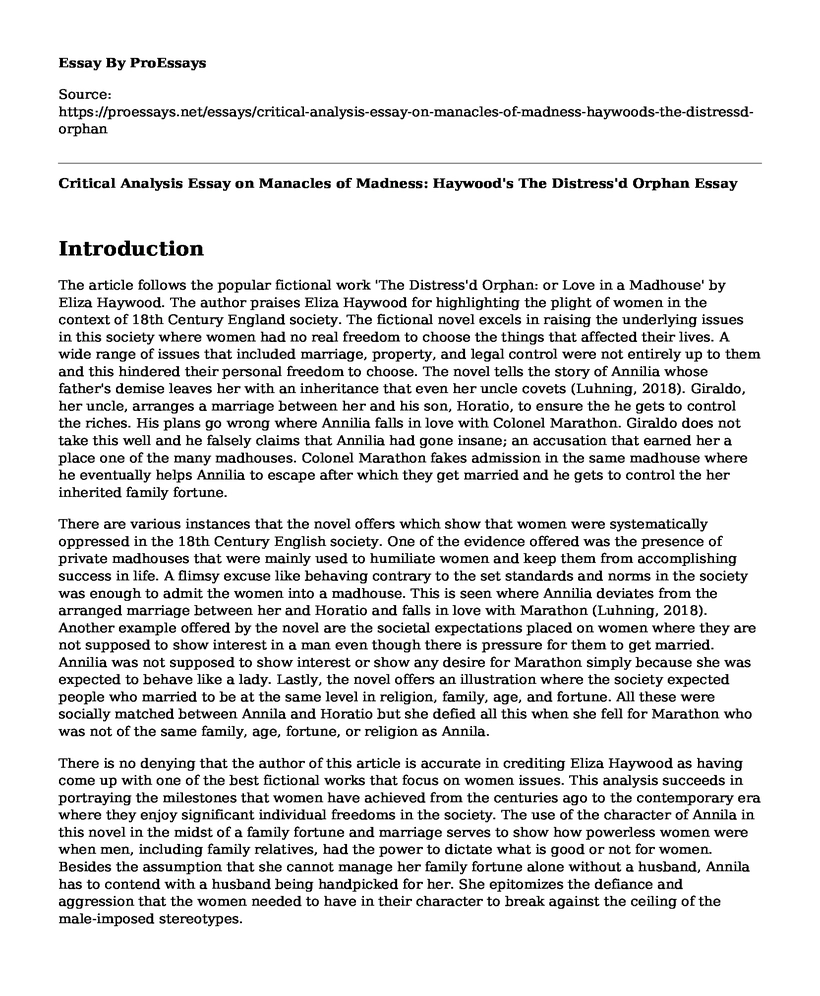Introduction
The article follows the popular fictional work 'The Distress'd Orphan: or Love in a Madhouse' by Eliza Haywood. The author praises Eliza Haywood for highlighting the plight of women in the context of 18th Century England society. The fictional novel excels in raising the underlying issues in this society where women had no real freedom to choose the things that affected their lives. A wide range of issues that included marriage, property, and legal control were not entirely up to them and this hindered their personal freedom to choose. The novel tells the story of Annilia whose father's demise leaves her with an inheritance that even her uncle covets (Luhning, 2018). Giraldo, her uncle, arranges a marriage between her and his son, Horatio, to ensure the he gets to control the riches. His plans go wrong where Annilia falls in love with Colonel Marathon. Giraldo does not take this well and he falsely claims that Annilia had gone insane; an accusation that earned her a place one of the many madhouses. Colonel Marathon fakes admission in the same madhouse where he eventually helps Annilia to escape after which they get married and he gets to control the her inherited family fortune.
There are various instances that the novel offers which show that women were systematically oppressed in the 18th Century English society. One of the evidence offered was the presence of private madhouses that were mainly used to humiliate women and keep them from accomplishing success in life. A flimsy excuse like behaving contrary to the set standards and norms in the society was enough to admit the women into a madhouse. This is seen where Annilia deviates from the arranged marriage between her and Horatio and falls in love with Marathon (Luhning, 2018). Another example offered by the novel are the societal expectations placed on women where they are not supposed to show interest in a man even though there is pressure for them to get married. Annilia was not supposed to show interest or show any desire for Marathon simply because she was expected to behave like a lady. Lastly, the novel offers an illustration where the society expected people who married to be at the same level in religion, family, age, and fortune. All these were socially matched between Annila and Horatio but she defied all this when she fell for Marathon who was not of the same family, age, fortune, or religion as Annila.
There is no denying that the author of this article is accurate in crediting Eliza Haywood as having come up with one of the best fictional works that focus on women issues. This analysis succeeds in portraying the milestones that women have achieved from the centuries ago to the contemporary era where they enjoy significant individual freedoms in the society. The use of the character of Annila in this novel in the midst of a family fortune and marriage serves to show how powerless women were when men, including family relatives, had the power to dictate what is good or not for women. Besides the assumption that she cannot manage her family fortune alone without a husband, Annila has to contend with a husband being handpicked for her. She epitomizes the defiance and aggression that the women needed to have in their character to break against the ceiling of the male-imposed stereotypes.
Reference
Luhning, H. (2018). Manacles of madness: Haywood's the distress'd orphan; or love in a madhouse. eSharp Issue 8. University of Saskatchewan.
Cite this page
Critical Analysis Essay on Manacles of Madness: Haywood's The Distress'd Orphan. (2022, Aug 15). Retrieved from https://proessays.net/essays/critical-analysis-essay-on-manacles-of-madness-haywoods-the-distressd-orphan
If you are the original author of this essay and no longer wish to have it published on the ProEssays website, please click below to request its removal:
- Communication Experience
- Essay on Human Trafficking in Texas
- Domestic Abuse Among Teenagers Research Paper
- Differences in Home Food and Activity Environments Between Obese and Healthy Weight Families of Preschool Children
- Poverty in Education Essay Example
- Domestic Violence: A Deep-Rooted Historical Problem Now in Focus - Essay Sample
- Paper Example on Enhancing Cross-Cultural Management: A Case Study of Hydro-Generation in Tanzania







